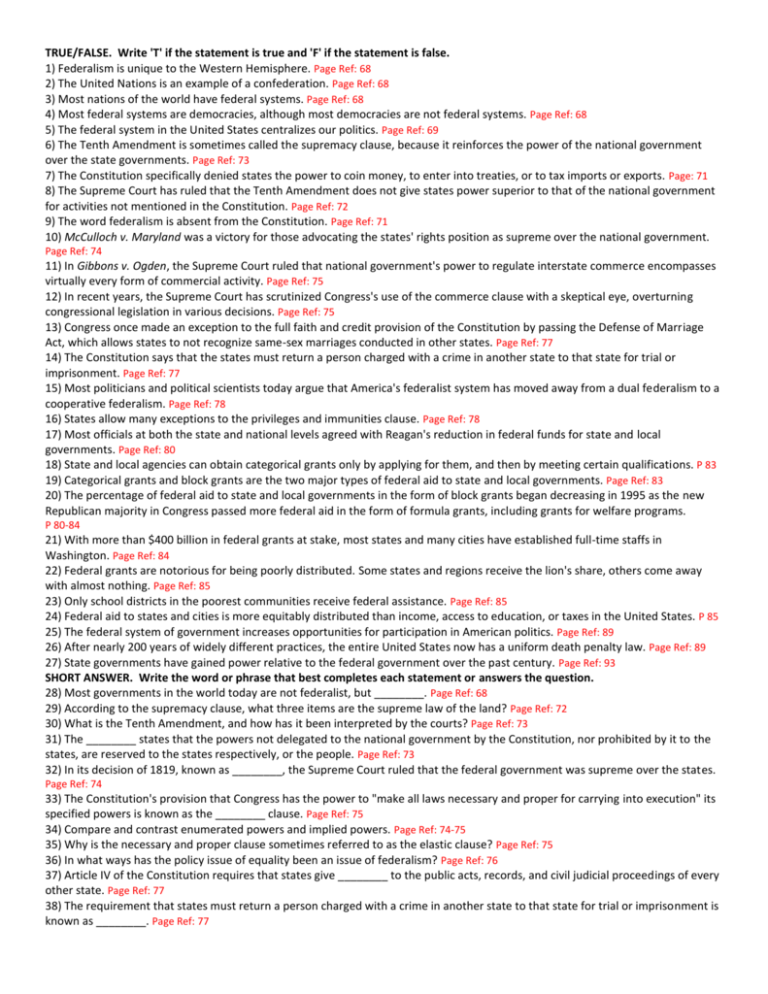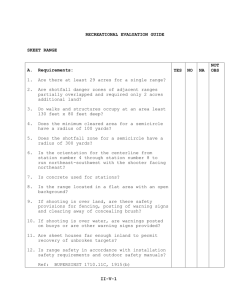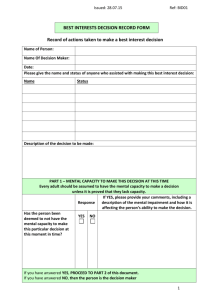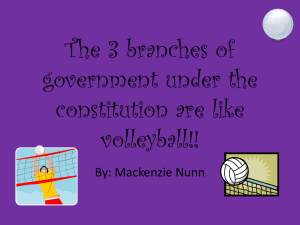TRUE/FALSE. Write `T` if the statement is true and `F` if the statement
advertisement

TRUE/FALSE. Write 'T' if the statement is true and 'F' if the statement is false. 1) Federalism is unique to the Western Hemisphere. Page Ref: 68 2) The United Nations is an example of a confederation. Page Ref: 68 3) Most nations of the world have federal systems. Page Ref: 68 4) Most federal systems are democracies, although most democracies are not federal systems. Page Ref: 68 5) The federal system in the United States centralizes our politics. Page Ref: 69 6) The Tenth Amendment is sometimes called the supremacy clause, because it reinforces the power of the national government over the state governments. Page Ref: 73 7) The Constitution specifically denied states the power to coin money, to enter into treaties, or to tax imports or exports. Page: 71 8) The Supreme Court has ruled that the Tenth Amendment does not give states power superior to that of the national government for activities not mentioned in the Constitution. Page Ref: 72 9) The word federalism is absent from the Constitution. Page Ref: 71 10) McCulloch v. Maryland was a victory for those advocating the states' rights position as supreme over the national government. Page Ref: 74 11) In Gibbons v. Ogden, the Supreme Court ruled that national government's power to regulate interstate commerce encompasses virtually every form of commercial activity. Page Ref: 75 12) In recent years, the Supreme Court has scrutinized Congress's use of the commerce clause with a skeptical eye, overturning congressional legislation in various decisions. Page Ref: 75 13) Congress once made an exception to the full faith and credit provision of the Constitution by passing the Defense of Marriage Act, which allows states to not recognize same-sex marriages conducted in other states. Page Ref: 77 14) The Constitution says that the states must return a person charged with a crime in another state to that state for trial or imprisonment. Page Ref: 77 15) Most politicians and political scientists today argue that America's federalist system has moved away from a dual federalism to a cooperative federalism. Page Ref: 78 16) States allow many exceptions to the privileges and immunities clause. Page Ref: 78 17) Most officials at both the state and national levels agreed with Reagan's reduction in federal funds for state and local governments. Page Ref: 80 18) State and local agencies can obtain categorical grants only by applying for them, and then by meeting certain qualifications. P 83 19) Categorical grants and block grants are the two major types of federal aid to state and local governments. Page Ref: 83 20) The percentage of federal aid to state and local governments in the form of block grants began decreasing in 1995 as the new Republican majority in Congress passed more federal aid in the form of formula grants, including grants for welfare programs. P 80-84 21) With more than $400 billion in federal grants at stake, most states and many cities have established full-time staffs in Washington. Page Ref: 84 22) Federal grants are notorious for being poorly distributed. Some states and regions receive the lion's share, others come away with almost nothing. Page Ref: 85 23) Only school districts in the poorest communities receive federal assistance. Page Ref: 85 24) Federal aid to states and cities is more equitably distributed than income, access to education, or taxes in the United States. P 85 25) The federal system of government increases opportunities for participation in American politics. Page Ref: 89 26) After nearly 200 years of widely different practices, the entire United States now has a uniform death penalty law. Page Ref: 89 27) State governments have gained power relative to the federal government over the past century. Page Ref: 93 SHORT ANSWER. Write the word or phrase that best completes each statement or answers the question. 28) Most governments in the world today are not federalist, but ________. Page Ref: 68 29) According to the supremacy clause, what three items are the supreme law of the land? Page Ref: 72 30) What is the Tenth Amendment, and how has it been interpreted by the courts? Page Ref: 73 31) The ________ states that the powers not delegated to the national government by the Constitution, nor prohibited by it to the states, are reserved to the states respectively, or the people. Page Ref: 73 32) In its decision of 1819, known as ________, the Supreme Court ruled that the federal government was supreme over the states. Page Ref: 74 33) The Constitution's provision that Congress has the power to "make all laws necessary and proper for carrying into execution" its specified powers is known as the ________ clause. Page Ref: 75 34) Compare and contrast enumerated powers and implied powers. Page Ref: 74-75 35) Why is the necessary and proper clause sometimes referred to as the elastic clause? Page Ref: 75 36) In what ways has the policy issue of equality been an issue of federalism? Page Ref: 76 37) Article IV of the Constitution requires that states give ________ to the public acts, records, and civil judicial proceedings of every other state. Page Ref: 77 38) The requirement that states must return a person charged with a crime in another state to that state for trial or imprisonment is known as ________. Page Ref: 77 39) The cornerstone of the national government's relations with the state and local governments is ________ federalism: the pattern of spending, taxing, and providing grants in the federal system. Page Ref: 82 40) ________ are the main instrument the national government uses to influence states and localities. Page Ref: 82 41) ________ is the policy area that receives the largest percentage of federal grants. Page Ref: 83 42) What is a categorical grant, and how is it different from a block grant? Page Ref: 83-84 43) The withholding of federal funds for one program if a state does not take action in another area is a(n) ________. Page Ref: 83 44) A condition on one federal grant that is extended to all activities supported by federal funds is a(n) ________. Page Ref: 83 45) ________ occur when a condition on one federal grant is extended to all activities supported by federal funds, regardless of their source. Page Ref: 83 46) A(n) ________ occurs when the federal government requires state and local governments to comply with federal rules under threat of penalty or as a condition of receipt of a federal grant. Page Ref: 85 ESSAY. Write your answer in the space provided or on a separate sheet of paper. 47) Define the term federalism and compare and contrast it with unitary and confederation governments. Give examples of each. Page Ref: 68-69 48) Describe American federalism and contrast federalism to unitary government. For a country like the United States, is federalism an appropriate system? Explain. Page Ref: 68-71 49) Why is federalism considered so important? Explain how federalism decentralizes politics and policies. Page Ref: 68-71 50) Describe the federal system as formulated in the original design of the Constitution. Explain how federalism has evolved or changed since the writing of the Constitution, particularly in terms of the establishment of national supremacy. Page Ref: 71-76 51) List some of the powers specifically granted to the state governments by the Constitution. List some of the powers specifically denied the states by the Constitution. Do the powers granted and denied seem wise? Explain. Page Ref: 72 52) Briefly describe and state the historical significance of the McCulloch v. Maryland decision. Did the Supreme Court issue a fair decision or did this undermine a proper balance in federalism? Explain. Page Ref: 74 53) Explain what happened in the Supreme Court cases of McCulloch v. Maryland and Gibbons v. Ogden? What is the importance of each case to the distribution of powers between the states and the national government? Page Ref: 74-75 54) Explain the relationships and obligations between the states in the American federal system. Use specific examples to illustrate your answer. Page Ref: 76-78 55) Compare and contrast dual federalism and cooperative federalism. What are the standard operating procedures for cooperative federalism? Page Ref: 78-80 56) Define what is meant by "fiscal federalism." How is it manifested through the federal grant system? What are the advantages and disadvantages of each of the different types of grants? Page Ref: 82-85 57) What means and strategies do the states and communities use to compete with each other for federal dollars? Under what circumstances might the states and localities not want to receive federal aid? Page Ref: 84-85 58) To what extent has the new Republican majority, first elected in mid 1990s, limited the scope of government? enhanced it? Page Ref: 84-86 59) What are the advantages and disadvantages to democracy under a federal system? If you were drafting the Constitution today, would you opt to continue federalism or try something else? Explain. Page Ref: 84 60) Discuss how federalism creates a more democratic political system. Page Ref: 89-91 61) Explain and give specific examples of the advantages and disadvantages of federalism for democratic government. Page Ref: 89-91 62) Generally, how do the 50 states and Washington, D.C. differ in their laws regarding state welfare benefits? On per-capita spending on public education? Is this a problem in a country like the United States, or a strength of our system? Explain. Page Ref: 89-91 63) Describe how our federal system allocates responsibilities to state and federal governments. Have these responsibilities changed over time? How has federalism influenced the scope of government? Page Ref: 92-93





